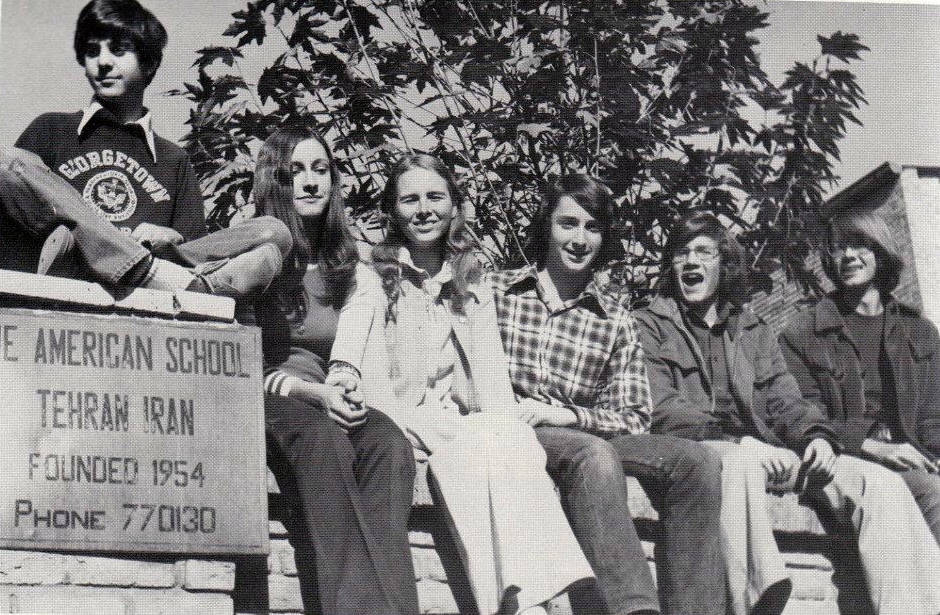Tori Egherman writes for Tehran Bureau:
In 1978, the Tehran American School closed its doors after 24 years in operation. J. Thom McInnis, a high school senior at the time, had a part-time job working for Pan Am. "I remember evacuating many of my schoolmates and their families those last days when I worked at the airport," he says. "I remember fathers throwing their children over the heads of the crowds at the airport in a bid to get closer to the front of the line for those limited seats out of the country."
For Anthony Roberts, author of Sons of the Great Satan, the sudden departure from Iran came as a shock. "I was angry. I was pissed off. I didn't understand it because I was a teenaged boy. Now that I am older, I understand it was the loss that really made me angry." Overnight, his whole world abruptly changed. He was separated from his closest friends and uprooted from the place he'd come to call home.
When I left Iran, I didn't know what happened to any of my classmates for 30 years....It wasn't like so-and-so went off to this college and so-and-so went off to that college. It was like 24 hours. You can pack one bag. You have to leave now. Nothing set up on the other end. You're just going home to set up with relatives and go on from there.
Social networking brought the former classmates back together. They started reaching out to one another and now have several active groups on Facebook. Roberts says, "For some of us there were tears. It was like a 30-year-old weight lifted from us."
Paul Stevenson, who now teaches linguistics and grammar in Iraqi Kurdistan, was excited to go to Iran as a teenager. He was interested in language and enjoyed the chance to learn Persian. He talks about the special dynamics of the students at the Tehran American School. "The intensity of our relationships was stronger because we didn't have the rest of American society to live our American lives. School was a very, very big deal. It was a lot of fun being there. We'd get there early. There were plenty of after school activities."
He explains that, like most teenagers, he was too absorbed in his own life to notice the growing political unrest around them.
"If you really wanted to know what was going on in Iran at the time, you needed to talk to the elementary school kids," says Jonathan Lee, who was "a very mature 12" at the time he lived in Iran. Many of his classmates had parents in the State Department who worked closely with the Shah's government. Adults spoke in front of them, he explained. They thought they were too young to understand. "We'd get on the bus every morning and compare notes."
Despite his young age, Lee explored every corner of Tehran using his father's expense account to hire taxis. "For some odd reason, Iranians thought I looked like a young Cassius Clay. We had doors opened up for us because everywhere we went people saw this young black American kid who looked like Muhammad Ali. Everywhere I went, a crowd gathered."
When American Bell International (now AT&T) evacuated its employees and their families, Lee was excited to return to the States. Soon after he started school, however, things changed. With the hostage taking at the U.S. Embassy in November 1979, Iran became Americans' enemy number one. Lee states, "I was not an American kid who lived in Iran; I was the Iranian. I got picked on constantly."
T. Lilly Littlewater's father was in the U.S. military. Her neighbors were families with people who worked for the Shah. "I hate to think of what happened to the people we left behind," she says. When she was older and asked her father what had happened to them, he wouldn't tell her. "You don't want to know," he said.
"My father really believed he was serving his country. When we left Iran, he was a changed man. He never recovered."
***
Despite the fact that most led lives fairly isolated from Iranian society and had few if any Iranian friends, many of the former students of the Tehran American School developed life-long ties to the country. "I feel exiled from what I consider my second home," says Littlewater.
What they miss about Iran is not all that different from what any Iranian in the diaspora misses. They miss eating labu, roasted beets, sold on the side of the road. They miss the mountains, hiking and camping. They miss bread cooked over open flames in ancient ovens. They miss their friends and the community they formed together.
Lee comments, "Why do people fall in love with Iran? Anyone who has spent time there will say it's the people and the country."
Posted via email from lissping

No comments:
Post a Comment
Note: only a member of this blog may post a comment.